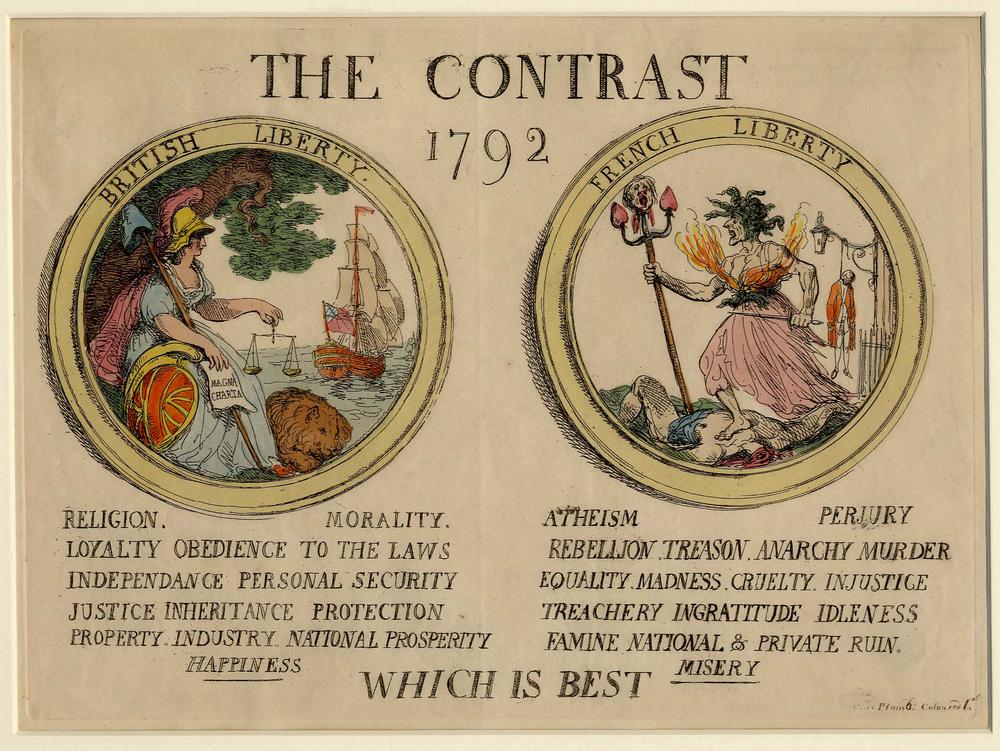
On 10 August 1792, the French monarchy was overthrown. Even though many Britons had been impressed by the revolution of 1789, it was now obvious that the French revolution was escalating into a civil war. The British idea of liberty, based on the parliamentary monarchy established in 1688, following the “Glorious revolution” was challenged by French radicalism. More, the French revolution was becoming a threat to its European neighbours. Propaganda leaflets like this one were intended to convince the British public to reject the ideology of revolutionary France and to support the British government in its efforts to contain it. War actually began on 1 February 1793. King Louis XVI had been executed on 21 January.
1res européennes
9 September 2024
The French revolution: a view from England
➣ Why are English (and American) historians so interested in our revolution ?
➣ How did the English public react to the FR ? And why did the English government eventually wage war against it?
- In class, listen, read the documents and participate as often as you can. According to several surveys, more than 80% of an individual pupil's efficiency depends on what is done (or not done!) in class.
- At home, read the documents and classroom notes again. The learning of new words and new grammatical skills deserves top priority. Visit the links and watch the proposed videos, prepare the subject for the next class.
- The evaluation grid is used at the final exam. Look at it to understand what is expected. The grid is based on three independent scales: the first one (6 points) relates to the knowledge in history and geography ; the second one (6 points) to understanding questions and answering them ; the last one is about linguistic skills (8 points).
- In the final exam, you'll choose one of two subjects, each one based on a different part of the syllabus. Once your choice is made, you have got twenty minutes to prepare a speech of ten minutes: using the documents and your knowledge, answer the question. The second part of the exam consists in Q&As, independent from the subject. It's a conversation in English.
❑ Subject № 1 : The Contrast. See the annotated version.
➣ Ordre de passage pour les oraux en classe (chacun passe une fois entre les deux premiers trimestres). Un devoir écrit pour le 1er trimestre aura lieu le 18 novembre.
❑ Subject № 2 : a text by Mary Wollstonecraft and an etching representing the execution (“martyrdom”) of king Louis XVI.
September 16, 2024
❑ Subject № 1 (continued from September 9) : The Contrast. See the annotated version.
 ➣ READ: Timothy Tackett's vision of the French revolution. [See the annotated version]. Tackett is an American historian. In his book, When the king took flight (Harvard, 2004) he puts stress on the contrast between the lofty ideals of the revolution and the regime of Terror that followed. He takes sides with the revolution and argues that the monarchy, not the people, is to blame for the violence that happened. The people were oppressed, their rebellion was legitimate, and king Louis XVI failed to implement the social and political reforms that might have prevented the outburst of violence.
➣ READ: Timothy Tackett's vision of the French revolution. [See the annotated version]. Tackett is an American historian. In his book, When the king took flight (Harvard, 2004) he puts stress on the contrast between the lofty ideals of the revolution and the regime of Terror that followed. He takes sides with the revolution and argues that the monarchy, not the people, is to blame for the violence that happened. The people were oppressed, their rebellion was legitimate, and king Louis XVI failed to implement the social and political reforms that might have prevented the outburst of violence.
September 23, 2024
❑ See the annotated version of Tackett's text (completed). We can argue that Tackett, although his opinion is balanced (see his criticism of Terror as “totalitarian”), is nevertheless for the French revolution. Tackett definitely puts the blame on the king.
 ➣ WATCH: Richard Clay, “Tearing up history” (BBC, 2014). A study of revolutionary violence and of its relationship to political emancipation. Professor Clay is an English historian who has focused on iconoclasm. Iconoclasm means the destruction of images, statues and symbols. R. Clay admires the FR which “changed the world”. He admires it because of its values: liberty, equality and brotherhood (universal values). He likes the FR, notwithstanding (in spite of) its dark episodes.
➣ WATCH: Richard Clay, “Tearing up history” (BBC, 2014). A study of revolutionary violence and of its relationship to political emancipation. Professor Clay is an English historian who has focused on iconoclasm. Iconoclasm means the destruction of images, statues and symbols. R. Clay admires the FR which “changed the world”. He admires it because of its values: liberty, equality and brotherhood (universal values). He likes the FR, notwithstanding (in spite of) its dark episodes.
September 30, 2024
➣ Orals : Mélusine ★★ (subject № 2) ; Gabriel (postponed).
About stars. One star means good (★), two stars very good (★★), three stars outstanding (★★★). No star refers to an acceptable, though not remarkable performance. The unamused face (😒) would mean a dissapointing experience. Hopefully, it won't be needed.
❑ Subject № 3 : An utterly subversive revolution.
❑ Subject № 4, also for available for orals.
❑ Subject № 2 can still be used.
Milestones (or turning points) during The French Revolution
❑ 5 May 1789 : King Louis XVI has summoned the General estates to help solve the financial crisis. An unusual move, since the estates had never been called since 1614.
❑ 17 June 1789 : the representatives of the Third Estate proclaim themselves National Assembly, thus affirming the sovereignty of the nation. Arguably, the French Ancien Régime died on that day. On June 20, with the Tennis Court oath, the representatives make the pledge to give a constitution to the country.
❑ 14 July 1789 : the storming of the Bastille. Fearing an attack by the royal troops, the people of Paris attack the fortress to take gus and ammunition. Three days later, in a gesture of goodwill, Louis XVI comes to meet Bailly, the mayor of Paris, and accepts to wear the three colours of the insurgents.
❑ 26 August 1789 : the National Assembly publishes the Declaration of the Rights of Man and the Citizen.
❑ 14 July 1790 : the Festival of the Federation. The king seems to accept the idea of a constitutional monarchy. Louis XVI, however, had a predicament, because the pope had condemned the Civil constitution of the Clergy.
❑ 21 June 1791 : the king and his family try to escape, but they fail. They are stopped in Varennes (Eastern France) and brought back to Paris where, on 17 July, a demonstration of the Sans-Culottes asking for the impeachment of the king is crushed by the national Guard, commanded by La Fayette. The first bloodshed between the king and the people.
❑ 20 April 1792 : the king persuades the assembly to declare war on Austria. Secretly, he hopes that revolutionary France may lose the war, thus incurring the risk to be seen as a traitor.
❑ 10 August 1792 : the Sans-Culottes storm the Tuileries. The monarchy is overthrown and a republic established on 21 September in a climate of civil war. The king, now a political prisoner, is sentenced to death in December and executed on 21 January 1793.
October 7, 2024
➣ Orals : Louise ★★ (subject № 3) ; Gabriel ★★ (subject № 2) ; Anna ★★★ (subject № 4).
Mary Wollstonecraft (1759-1797), English feminist and admirer of the French Revolution
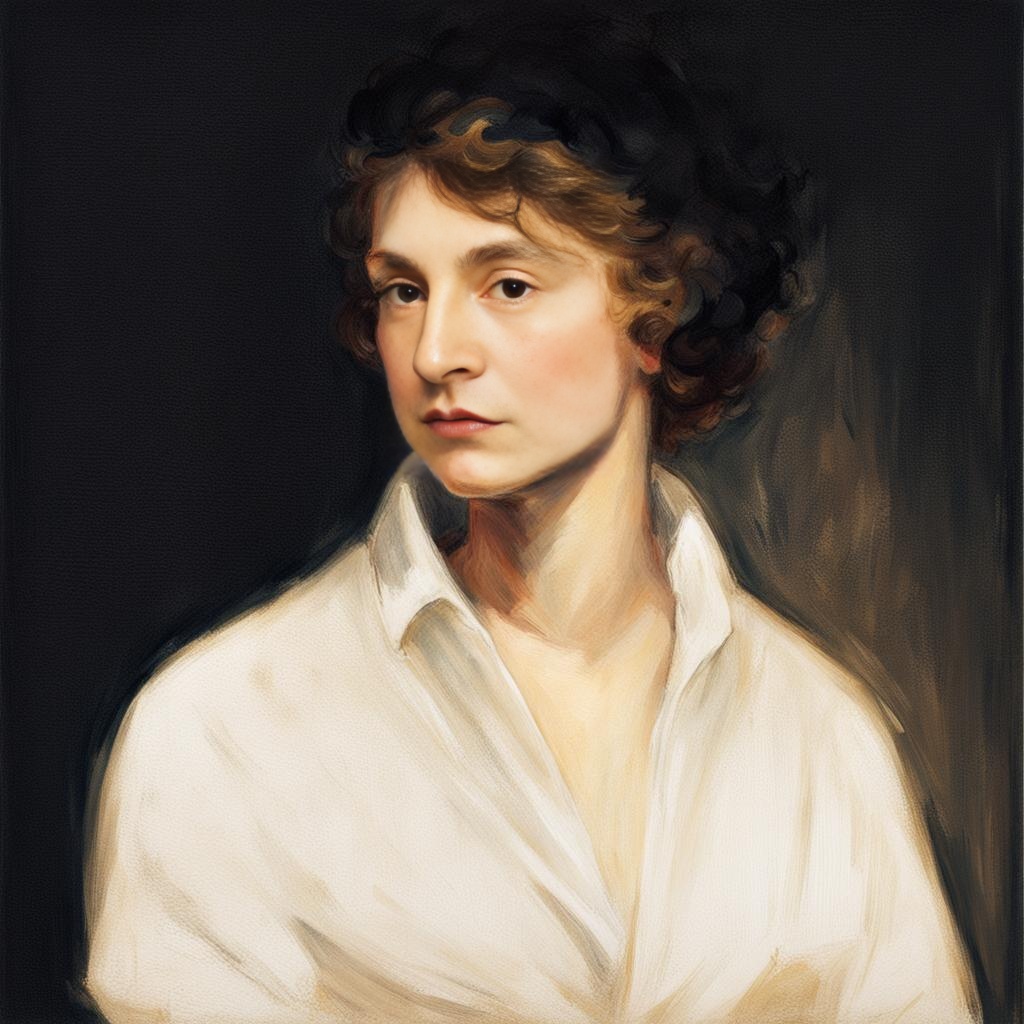 In England, many intellectuals admired the FR, because for them it meant progress, emancipation and a fairer society. Meanwhile, others like Burke, said that the FR was leading to the reign of Terror. Mary Wollstonecraft was a “one-woman revolution”. She believed in what we call gender equality. She was a determined feminist (supporter of women’s rights). She wrote the Vindication of the rights of woman (1792), under the influence of the FR. She argued that (the problem was that) women were educated to please men, and that equal access to education should be granted to them. For this, she was called “ a hyena in petticoats” by Walpole, who did not share her progressive views. Her ideas were very similar to those defended by Olympe de Gouges in France.
In England, many intellectuals admired the FR, because for them it meant progress, emancipation and a fairer society. Meanwhile, others like Burke, said that the FR was leading to the reign of Terror. Mary Wollstonecraft was a “one-woman revolution”. She believed in what we call gender equality. She was a determined feminist (supporter of women’s rights). She wrote the Vindication of the rights of woman (1792), under the influence of the FR. She argued that (the problem was that) women were educated to please men, and that equal access to education should be granted to them. For this, she was called “ a hyena in petticoats” by Walpole, who did not share her progressive views. Her ideas were very similar to those defended by Olympe de Gouges in France.
❑ In the fall of 1792, she arrived in France. She was soon disappointed by the lack of respect shown by the Sans-culottes to women, and horrified by the outburst of violence after the fall of the monarchy.
❑ MW, an Englishwoman, soon came under suspicion for being an English spy. She was saved by her marriage with an American businessman.
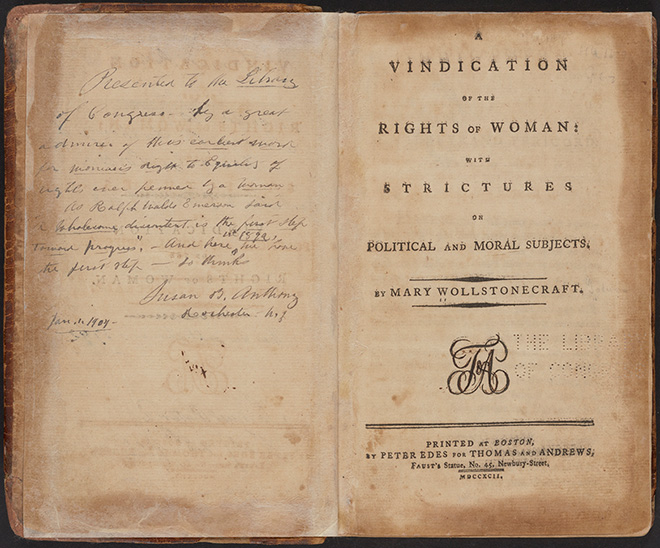
➣ WATCH: Simon Schama's history of Britain, episode 12. Look at 23 minutes from the beginning for our extract on Mary Wollstonecraft.
October 14, 2024
 Ordre de passage pour les oraux en classe mis à jour le 14 octobre (chacun passe une fois entre les deux premiers trimestres). Sujets possibles : 2, 3 ou 4 (sur un seul document ou sur l'ensemble du sujet). Rappel : Un devoir écrit pour le 1er trimestre aura lieu le 4 novembre, à la rentrée des vacances de Toussaint.
Ordre de passage pour les oraux en classe mis à jour le 14 octobre (chacun passe une fois entre les deux premiers trimestres). Sujets possibles : 2, 3 ou 4 (sur un seul document ou sur l'ensemble du sujet). Rappel : Un devoir écrit pour le 1er trimestre aura lieu le 4 novembre, à la rentrée des vacances de Toussaint.
➣ Orals : Alix★★, Ezra (postponed to November 18).
During that class, we finish the story of Mary Wollstonecraft and begin discussing the life of Edmund Burke.
Edmund Burke (1729-1797), a liberal MP opposed to the French Revolution
 Burke was an Englishman with an Irish mother. He did not belong to the nobility. Because of his own literary skills and thanks to the support of some influential lords, he got a seat in Parliament. Burke was a whig, a liberal. As such, he took sides with the American insurgents and later with the Indians oppressed by the corrupt and greedy governor Warren Hastings. Yet, he did not approve of the French revolution, because, from the very beginning, he was convinced that it would escalate into terror. His major book, published in 1790, is the Reflections on the revolution in France. On 6 May 1791, he delivered a speech against those who, like his whig fellow Fox, were supporting the French Revolution. He argued that it should not be imitated in the UK. Later on, he argued that no peace should ever be made with a “regicide” France.
Burke was an Englishman with an Irish mother. He did not belong to the nobility. Because of his own literary skills and thanks to the support of some influential lords, he got a seat in Parliament. Burke was a whig, a liberal. As such, he took sides with the American insurgents and later with the Indians oppressed by the corrupt and greedy governor Warren Hastings. Yet, he did not approve of the French revolution, because, from the very beginning, he was convinced that it would escalate into terror. His major book, published in 1790, is the Reflections on the revolution in France. On 6 May 1791, he delivered a speech against those who, like his whig fellow Fox, were supporting the French Revolution. He argued that it should not be imitated in the UK. Later on, he argued that no peace should ever be made with a “regicide” France.
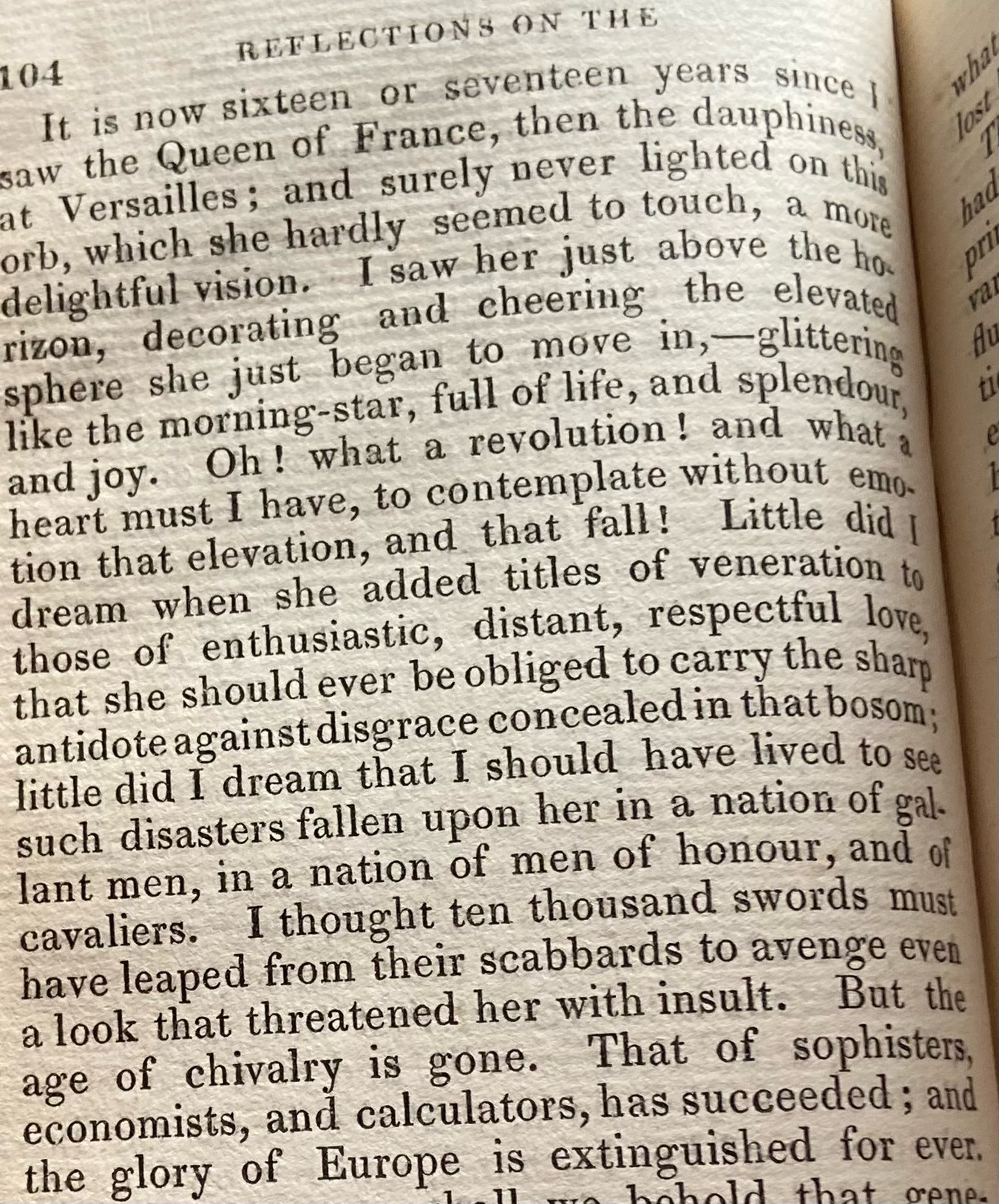
A famous excerpt of the Reflections, in which the author felt sorrow for the misfortunes of Queen Marie-Antoinette, and argued that, with the advent of French revolution, Europe had ceased to be civilised (Personal library).
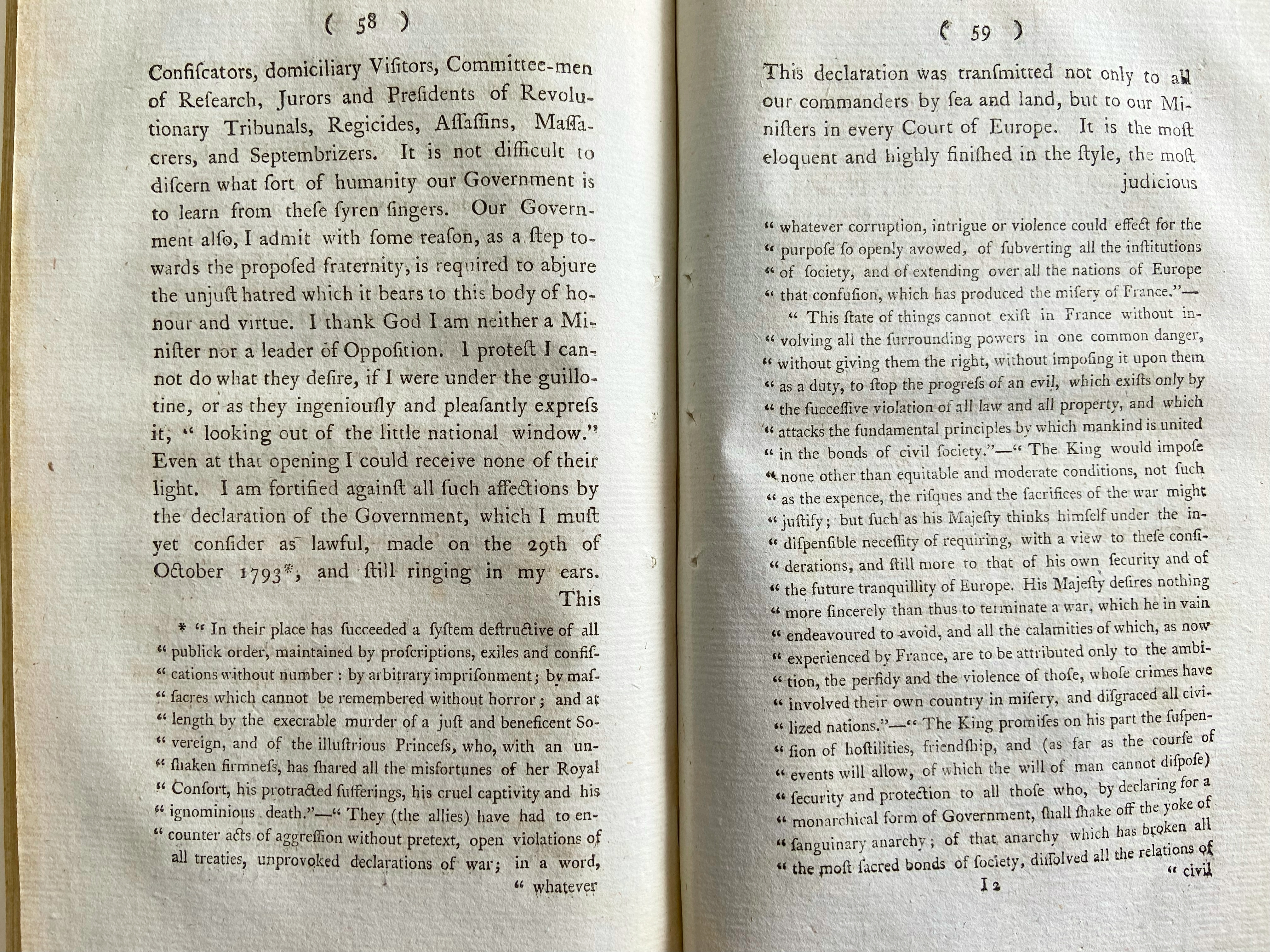
An excerpt from the Two letters addressed to an MP on the proposals for peace with the regicide Directory of France, London, Rivington, 1796. Until the end of his life, Burke recommended to go on fighting against revolutionary France, which he considered a mortal threat to the safety of England and English freedom (Personal library).
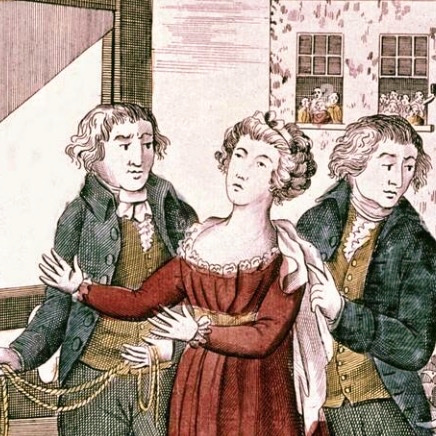 ➣ LISTEN TO The History Pod, on the execution of the former queen Marie-Antoinette (16 October 1793). Duration : 2'14". This account of the execution epitomises (is a perfect example of) the dislike of the French Revolution that still prevails in Britain. The History Pod provides other stories from the time of the French Revolution. A list of the many episodes of the podcast in chronological order can be found here.
➣ LISTEN TO The History Pod, on the execution of the former queen Marie-Antoinette (16 October 1793). Duration : 2'14". This account of the execution epitomises (is a perfect example of) the dislike of the French Revolution that still prevails in Britain. The History Pod provides other stories from the time of the French Revolution. A list of the many episodes of the podcast in chronological order can be found here.